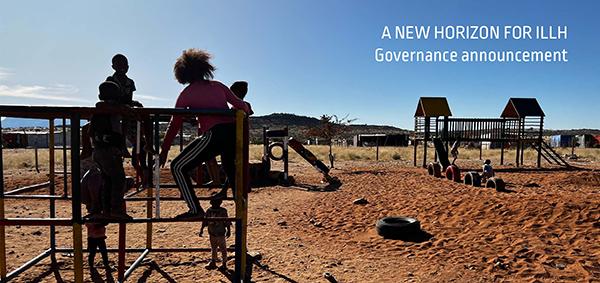A transition for the Institute for Land, Livelihoods and Housing

(A message from Dr Guillermo Delgado on the occasion of the institute's governance transition.)
The institute is undergoing a governance transition. After nearly eight years at the helm of the institute, Dr Guillermo Delgado is handing over the lead to a joint governance structure between the Department of Architecture, Planning and Construction (DAPC) and the Department of Land and Spatial Sciences (DLSS), both in the School of the Built Environment at the Faculty of Engineering and the Built Environment (FEBE).
This comes as a full circle, in which the institute is again steered by the mutual desire for collaboration between different disciplines in the fields of land, livelihoods and housing. In September 2015, colleagues from the two departments got together motivated by the desire to enhance joint research and outreach activities on these themes.
This group was formed by Charl-Thom Bayer, then Head of Department of DLSS, Dr Phillip Lühl, Prof Wolfgang Werner, Prof Mutjinde Katjiua, Ase Christensen, and Mr Samuel Hayford; which became the founding board for the institute. Dr Guillermo Delgado became the part-time coordinator.
The institute started with small-scale self-organised lectures, workshops, seminars; and some online presence through Twitter (now X) and Facebook. A Working Paper series was launched, giving an entry-level option to emerging and established researchers and practitioners to share work on the themes that the institute focuses.
In 2017, the institute obtained its first large commission from the Ministry of Urban and Rural Development. The assignment was to revise the Mass Housing Development Programme, which entailed revising the way in which the state supported housing. This was the first in a series of collaborations with this ministry and other government institutions around urban land and housing, in particular.
That same year, the institute organised the Urban Forum which convened over a hundred participants and a stellar roster of speakers; which was documented in a book of proceedings available online. It was here that key ideas and processes, such as scaling up informal settlement upgrading through a partnership approach, was born.
In 2018, the institute supported a process with civil society organisations leading up to the Second National Land Conference. This entailed a training for journalists, the release of fact sheets on key themes, and organizing round tables to discuss critical gaps in the Land Conference agenda: urban and ancestral land. Eventually, thanks to bottom-up pressure, these were included; and members of the institute were invited as key speakers. In partnership with NUST Library, a digital repository with all contributions to the 1992 and the 2018 Land Conferences was developed and placed online.
Following the conference, members of the institute were invited to develop the implementation plan of the conference resolutions on urban land. This, and several other workshops and trainings, cemented a relationship which culminated in establishing a Task Team for the Revision of the National Housing Policy led by MURD, the National Planning Commission, the Ministry of Finance and Public Enterprises, together with the Namibia Housing Action Group (NHAG), the Shack Dwellers Federation of Namibia (SDFN), and the National Housing Enterprise. The policy was approved in November 2023.
Several partnerships with outstanding institutions were forged, which enabled numerous events and outputs that have positioned NUST as a key actor in the focal themes of the institute. These are documented on the website, but it is important to highlight some here:
The partnership with NHAG / SDFN has been crucial for both institutions. For NUST, it has grounded students and staff in socially-relevant topics; and for SDFN-NHAG, it has provided direct support for their processes and prepared young professionals to engage in urban development in transformative ways.
The partnership with the German Cooperation Agency (GIZ) has enabled research, curriculum development, and trainings that will benefit a generation of urban practitioners. Partnerships were also formed with the University of Manchester, UN Habitat, the City of Windhoek, the Office of the First Lady, student associations at NUST, and with the Association of Local Authorities in Namibia (ALAN) and the Namibia Association of Local Authority Officials (NALAO).
The institute operated with modest budgets and its administration made possible thanks to a small number of people. It was not an easy task to enable collaboration, considering the heavy weight of compartmentalisation, as well as a teaching-oriented environment considering how young the university still is. However, plenty was made possible in these circumstances.
It is hard to measure the impact that the institute has had since its inception, but what is certain is that its activities and operations were possible thanks to a large number of people coming together, generously sharing their knowledge, time, and hope for transformation.
Conversations happened in the various venues at the university, in conference rooms, government buildings, as well as under the shade of trees and community centres. Activities included people living in informal settlements, leading academics, government officials, activists, students, and professionals of all ages, primarily young ones.
The role of the university has proven to be strategic in engaging with key issues of land and housing. The institute has also successfully enabled transdisciplinarity: not only collaboration between academics, but also between practitioners, implementing agencies, NGOs/CBOs, and central and local government.
Immense gratitude goes to the board members and collaborators of the institute, as well as the guests, associates, and participants. As of December 2023, the institute will be co-led by Mr Gert van der Merwe from DAPC and Prof Eugene Chigbu from DLSS. As per the NUST Strategic Plan 2021-25, they will be reporting to the Executive Dean of the Faculty, Prof Harmony Musiyarira.
With sincere appreciation and best wishes,
Dr Guillermo Delgado
